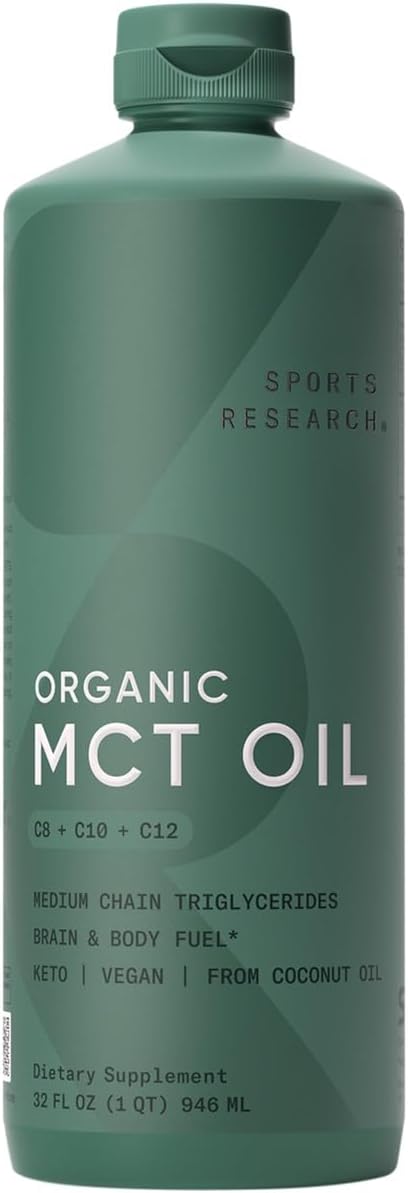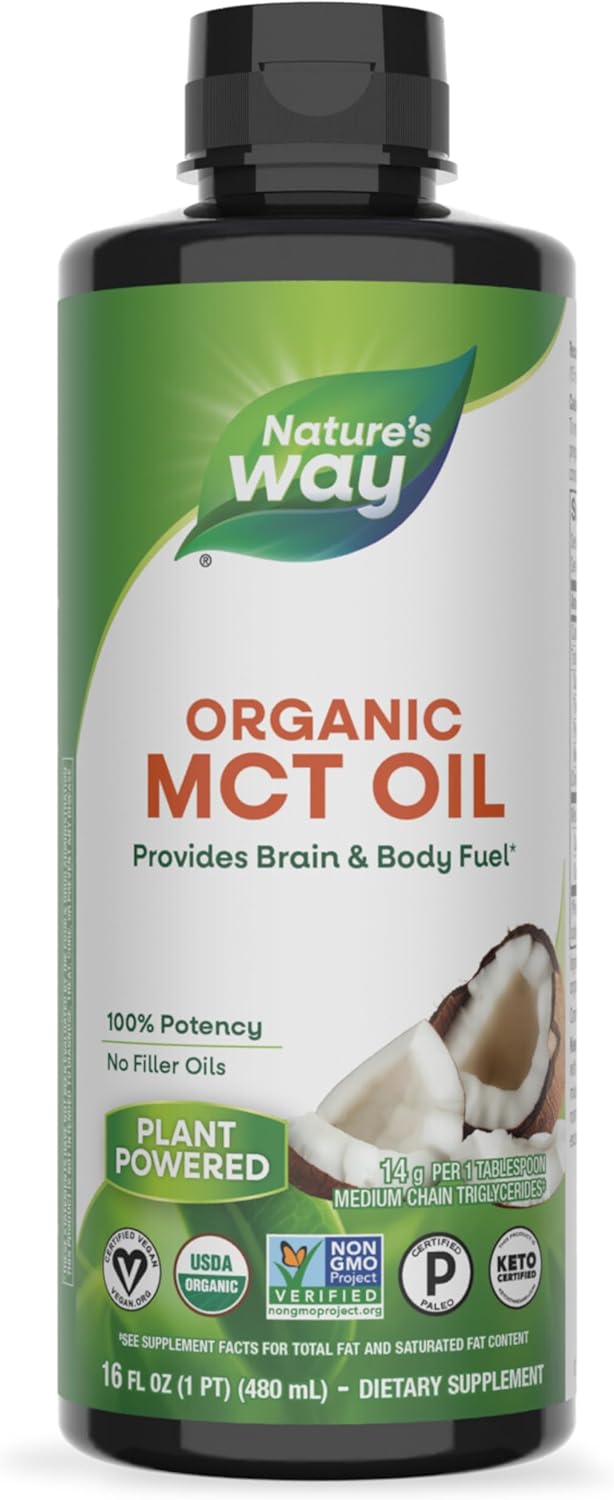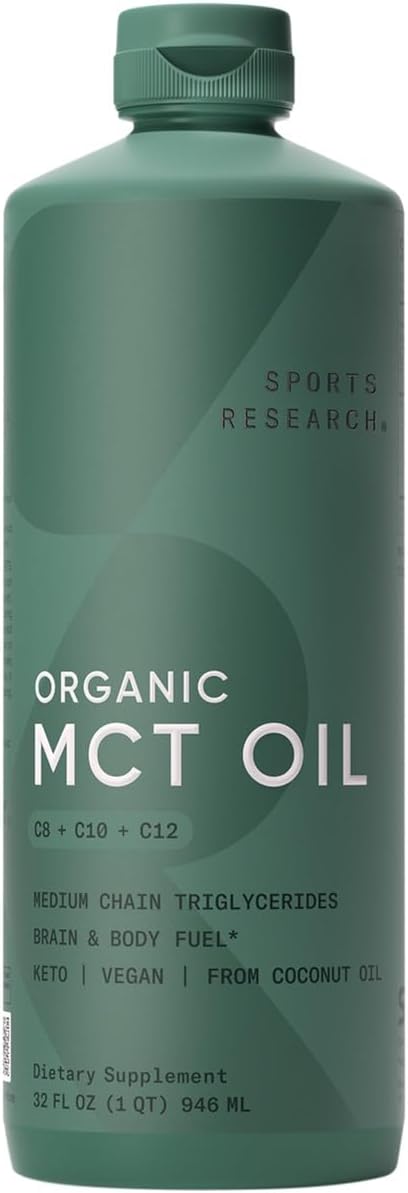

Your Brew Breakdown
Overview: Fueling Your Day with MCT Oil Coffee
Key Points: Understanding MCT Oil
What is MCT Oil?
Types of MCT Oil
Benefits of MCT Oil in Coffee
Recommended Dosage
Best Practices
How to Add MCT Oil to Your Coffee: A Step-by-Step Guide
Tips, Variations, and Recipes
MCT Oil vs. MCT Oil Powder
Flavor Variations
Cold Brew with MCT Oil
Start Small and Listen to Your Body
Benefits of Incorporating MCT Oil into Your Coffee Routine
Energy Boost
Cognitive Support
Weight Management
Nutrient Absorption
Versatility
Boost Your Brew: The Ultimate Guide to MCT Oil in Coffee
Overview: Fueling Your Day with MCT Oil Coffee

Pro Tip
**Tip:** Start with 1 teaspoon of MCT oil in your coffee and gradually increase to 1 tablespoon to avoid digestive discomfort. Blend thoroughly for a creamy texture and optimal absorption, ensuring sustained energy throughout your day.
Adding MCT oil to your coffee is a popular trend, transforming your morning brew into a powerful energy and cognitive booster. Medium-Chain Triglycerides (MCTs), derived primarily from coconut or palm kernel oil, offer a unique metabolic advantage, providing quick energy and potentially aiding weight management and cognitive function. This comprehensive guide will explore how to seamlessly incorporate MCT oil into your coffee routine, offering various recipes and tips to customize your experience.

MCT Oil Emulsification in Coffee
Incorporating MCT oil into coffee requires proper emulsification to ensure a smooth, homogeneous mixture. MCT oil, being hydrophobic, does not naturally dissolve in water-based liquids like coffee. Without emulsification, the oil can separate, creating an unappealing layer on the surface. To achieve a stable emulsion, mechanical blending or the use of an emulsifying agent is necessary. High-speed blenders, such as those from Vitamix or Nutribullet, are effective tools for this purpose, as they generate sufficient shear force to break down the oil into microdroplets, allowing it to disperse evenly throughout the coffee.
Benefits of MCT Oil Emulsification
- Enhances absorption of MCT oil, allowing for quicker energy utilization by the body.
- Creates a smoother texture in coffee, preventing oil separation and improving mouthfeel.
- Supports ketogenic diets by providing a convenient source of healthy fats.
- Increases bioavailability of nutrients, making it easier for the body to process and use MCT oil.
- Can be combined with other emulsifiers like lecithin for added stability and health benefits.
| Aspect | Mechanical Blending | Emulsifying Agent |
|---|---|---|
| Method | High-speed blenders (e.g., Vitamix, Nutribullet) | Use of emulsifiers (e.g., lecithin) |
| Result | Creates microdroplets for even dispersion | Adds stability and prevents separation |
| Texture | Smooth, homogeneous mixture | Improved mouthfeel and stability |
| Health Benefits | Enhances absorption and energy utilization | Increases bioavailability of nutrients |
| Diet Support | Convenient for ketogenic diets | Combines with other health benefits |
Key Points: Understanding MCT Oil

“Blending MCT oil into coffee ensures optimal emulsification, enhancing absorption and delivering sustained energy without separation.”
– Dr. Sarah Brewer, Nutritionist and Author of *The Essential Guide to MCTs*
Expert Insight
MCT oil’s rapid absorption makes it a standout for ketogenic diets, as it bypasses normal fat digestion, directly fueling the liver for quick energy and ketone production. Its unique structure also enhances cognitive function and endurance during fasting or low-carb states.
| Aspect | MCT Oil in Coffee | Normal Fat Digestion |
|---|---|---|
| Absorption Speed | Rapid absorption | Slower digestion process |
| Energy Delivery | Sustained energy without separation | Gradual energy release |
| Ketone Production | Directly fuels liver for quick ketone production | Indirect ketone production |
| Cognitive Function | Enhances cognitive function | No direct cognitive enhancement |
| Endurance Support | Boosts endurance during fasting/low-carb states | Limited endurance support |
What is MCT Oil?
MCT oil is a type of fat comprised of medium-chain triglycerides. Unlike long-chain triglycerides found in most fats, MCTs are rapidly absorbed and metabolized by the liver, providing a quick source of energy and ketones.
Benefits of MCT Oil
- Supports weight management by increasing satiety and boosting metabolism.
- Enhances cognitive function by providing ketones, an alternative energy source for the brain.
- Improves exercise performance by offering quick energy and reducing lactate buildup.
- May aid in managing conditions like epilepsy and Alzheimer’s due to its ketogenic properties.
- Commonly derived from coconut oil or palm kernel oil, both rich in medium-chain triglycerides.
- Often used in ketogenic diets to help maintain ketosis and support fat burning.
Types of MCT Oil
MCT oil typically comes in two main forms: C8 (caprylic acid) and C10 (capric acid), each with slightly different energy profiles. You can also find blends of both.
C8 vs C10 MCT Oil
- C8 (caprylic acid) is quickly converted into ketones, making it ideal for rapid energy and mental clarity.
- C10 (capric acid) provides a more sustained energy release, often preferred for endurance activities.
- Blended MCT oils combine C8 and C10 for balanced benefits, catering to a wider range of dietary needs.
- C8 is less likely to cause digestive discomfort compared to C10, which may affect sensitive individuals.
- Some MCT oils include trace amounts of C6 (caproic acid), but it’s less common due to its strong taste and potential stomach upset.
Benefits of MCT Oil in Coffee
Adding MCT oil to your coffee can offer several potential benefits, including increased energy levels, improved cognitive function, enhanced satiety (feeling full), and potential support for weight management.
How MCT Oil Enhances Coffee
- MCT oil is quickly metabolized by the liver, providing a rapid energy boost without the crash associated with sugar or caffeine alone.
- It contains fatty acids like caprylic and capric acid, which may improve focus and mental clarity by supporting brain function.
- Combining MCT oil with coffee can help stabilize blood sugar levels, reducing mid-morning energy slumps.
- The oil’s satiating properties may curb cravings, making it a useful addition for intermittent fasting or low-carb diets.
- Studies suggest MCT oil may increase fat oxidation, potentially aiding in weight loss when paired with a healthy diet.
- It blends well with coffee, creating a creamy texture without the need for dairy or artificial creamers.
Recommended Dosage
Start with a small amount, such as 1 teaspoon per 8-ounce cup of coffee. Gradually increase your intake up to 1-2 tablespoons daily, paying attention to how your body responds.
Dosage Adjustment Tips
- Monitor for side effects like jitteriness or digestive discomfort when increasing dosage.
- Consider splitting the daily dose into smaller amounts throughout the day for better tolerance.
- Consult a healthcare provider if you have underlying health conditions or take medications.
- Track your progress in a journal to note changes in energy levels or mood.
- Avoid exceeding 2 tablespoons daily unless advised by a professional.
Best Practices
For optimal absorption and a smooth texture, it’s best to blend the MCT oil into your coffee using a blender, frother, or immersion blender.

Blending Tips for MCT Oil
- Use a high-speed blender for a creamier, frothier consistency in your coffee.
- Immersion blenders are ideal for single servings and quick, mess-free blending.
- Frothers work well for lighter textures but may require longer blending times.
- Blend for 20-30 seconds to ensure the oil is fully emulsified and evenly distributed.
- Add MCT oil gradually to avoid clumping or separation in your drink.
- Experiment with blending temperatures-slightly warm coffee can enhance oil integration.
MCT Oil Emulsification Techniques
Emulsifying MCT oil into coffee is a critical step to ensure optimal absorption and a palatable texture. Unlike traditional fats, MCT oil is hydrophobic and does not naturally mix with water-based liquids like coffee. Without proper emulsification, the oil will separate, creating an uneven distribution and potentially causing gastrointestinal discomfort due to rapid digestion of unblended oil. To achieve a stable emulsion, mechanical blending is required. Tools such as high-speed blenders, handheld immersion blenders, or milk frothers are commonly used to break the oil into microdroplets, allowing it to disperse evenly throughout the coffee. This process mimics the natural emulsification that occurs in the digestive system, enhancing bioavailability and reducing the likelihood of digestive issues.
Effective Emulsification Methods
- Use high-shear mixers for uniform dispersion of MCT oil in water-based solutions.
- Incorporate emulsifiers like lecithin or polysorbate 80 to stabilize the oil-water mixture.
- Optimize temperature control (40-60°C) to enhance emulsification efficiency and stability.
- Employ ultrasonic homogenization for nanoemulsions, achieving smaller droplet sizes for better absorption.
- Consider phase inversion techniques to switch between oil-in-water and water-in-oil emulsions as needed.
- Monitor pH levels (6-8) to prevent destabilization of the emulsion during processing.
How to Add MCT Oil to Your Coffee: A Step-by-Step Guide

Quick Guide
1. Brew your coffee using your preferred method.
2. Add 1 teaspoon of MCT oil (adjust to taste).
3. Blend or froth thoroughly to emulsify for a creamy texture.
4. Enjoy your enhanced, energy-boosting coffee!
Brew Your Coffee:
Prepare your coffee using your preferred method (drip, French press, espresso, etc.).
Add MCT Oil:
Add your desired amount of MCT oil (start with 1 teaspoon).
Blend or Froth:
Use a blender, milk frother, or immersion blender to thoroughly emulsify the oil into the coffee for a creamy consistency.
Adjust to Taste:
Gradually increase the amount of MCT oil as tolerated, up to 1-2 tablespoons.
Optional Add-Ins:
Enhance the flavor with butter, cinnamon, vanilla extract, or unsweetened almond milk.
Emulsification Techniques for MCT Oil
Emulsifying MCT oil into coffee is a critical step to achieve a homogeneous mixture, preventing oil separation and ensuring a smooth, creamy texture. The process involves breaking down the oil into tiny droplets and dispersing them evenly throughout the coffee. This is typically accomplished using mechanical agitation, such as blending or frothing. High-speed blenders, immersion blenders, or handheld milk frothers are the most effective tools for this purpose. For instance, a high-speed blender operating at 20,000-30,000 RPM can create a stable emulsion by generating sufficient shear force to disperse the oil particles uniformly.
Key Emulsification Methods
- Use high-speed blenders to create stable MCT oil emulsions, ensuring even dispersion in liquids like coffee or smoothies.
- Incorporate natural emulsifiers like lecithin or gum arabic to improve texture and prevent oil separation.
- Experiment with ultrasonic homogenizers for nanoemulsions, ideal for enhancing bioavailability in supplements.
- Combine MCT oil with warm liquids (e.g., tea or broth) and whisk vigorously to achieve a temporary emulsion.
- Consider using pre-made MCT oil powder for easier emulsification in cold beverages or recipes.
Tips, Variations, and Recipes

Pro Tip
**Tip:** For a seamless blend, whisk MCT oil powder into warm liquids first before adding cold ingredients. This prevents clumping and ensures a smooth texture in your coffee, smoothies, or protein shakes.
MCT Oil vs. MCT Oil Powder
MCT oil powder is a convenient alternative; it blends more easily and avoids the oily texture some people find less appealing.
Benefits of MCT Oil Powder
- Easier to mix into beverages like coffee or smoothies without separation.
- Portable and travel-friendly, ideal for on-the-go use compared to liquid MCT oil.
- Less likely to cause digestive discomfort due to slower absorption.
- Often contains added ingredients like acacia fiber for improved texture and stability.
- Provides a neutral flavor profile, making it versatile for recipes and drinks.
Flavor Variations
Vanilla Almond MCT Coffee:
Add unsweetened almond milk and a dash of vanilla extract.
Cocoa MCT Iced Coffee:
Mix in cocoa powder and serve over ice.
Spiced MCT Coffee:
Add cinnamon, nutmeg, or ginger for a warm, comforting flavor.
Popular Flavor Combinations
- Classic pairings like chocolate and mint or strawberry and cream remain timeless favorites.
- Unique blends such as lavender honey or chili mango offer adventurous taste experiences.
- Seasonal variations, like pumpkin spice in fall or citrus in summer, cater to changing preferences.
- Regional specialties, such as matcha green tea in Japan or dulce de leche in Latin America, highlight cultural influences.
- Health-conscious options, including sugar-free or protein-infused flavors, appeal to modern dietary trends.
Cold Brew with MCT Oil
Add MCT oil to your cold brew coffee and blend for a refreshing iced coffee with a creamy texture.
Benefits of MCT Cold Brew
- MCT oil provides sustained energy and may enhance mental clarity due to its quick absorption.
- Blending creates a frothy, latte-like texture without the need for dairy or creamers.
- Use 1-2 tablespoons of MCT oil per cup of cold brew for optimal flavor and consistency.
- Pair with a dash of cinnamon or vanilla extract for added flavor complexity.
- Ideal for keto diets, as MCT oil supports fat-burning and low-carb lifestyles.
Start Small and Listen to Your Body
Begin with a small amount of MCT oil to minimize the risk of any potential digestive upset.

Tips for Introducing MCT Oil
- Start with 1 teaspoon daily and gradually increase to 1 tablespoon over 1-2 weeks.
- Pair MCT oil with meals to reduce the likelihood of stomach discomfort.
- Monitor for symptoms like bloating, cramps, or diarrhea, which may indicate overconsumption.
- Choose high-quality, pure MCT oil to avoid additives that could cause digestive issues.
- If discomfort occurs, reduce the dosage and reintroduce slowly as your body adapts.
MCT Oil Emulsification Techniques
MCT oil powder is a highly effective emulsified form of medium-chain triglycerides, designed to integrate seamlessly into beverages like coffee. Unlike liquid MCT oil, which can separate and create an oily layer, MCT oil powder undergoes a spray-drying process that encapsulates the oil in a matrix of carbohydrates or proteins. This encapsulation ensures uniform dispersion when blended, eliminating the need for vigorous shaking or additional emulsifiers. The powder’s hydrophilic properties allow it to dissolve quickly in both hot and cold liquids, making it ideal for recipes like iced coffee or cold brew.
Key Emulsification Methods
- Use high-shear mixers to create stable MCT oil emulsions with water-based solutions.
- Incorporate emulsifiers like lecithin or polysorbate 80 to improve oil-water blending.
- Apply ultrasonic homogenization for finer droplet sizes and enhanced emulsion stability.
- Experiment with phase inversion techniques to optimize emulsion viscosity and texture.
- Monitor temperature control (40-60°C) to prevent MCT oil degradation during emulsification.
- Test emulsion stability using centrifugation or shelf-life studies for quality assurance.
Benefits of Incorporating MCT Oil into Your Coffee Routine

“Adding MCT oil to your coffee fuels your brain with ketones, enhancing focus and energy without the sugar crash.”
– Dr. Dominic D’Agostino, Neuroscientist and Ketogenic Diet Expert
Expert Insight
MCT oil in coffee enhances ketone production, which fuels the brain more efficiently than glucose. This not only boosts mental clarity and focus but also supports sustained energy, making it ideal for productivity without the jitters or crashes.
Energy Boost
MCTs provide a quick and sustained energy boost without the crash often associated with other sources of energy.
Benefits of MCT Energy
- MCTs are rapidly absorbed and metabolized by the liver, providing immediate fuel for the body.
- Unlike sugars, MCTs help stabilize blood sugar levels, reducing energy crashes.
- They support mental clarity and focus, making them ideal for cognitive tasks.
- MCTs are commonly found in coconut oil, palm kernel oil, and dairy products.
- They are a popular choice for athletes and fitness enthusiasts for endurance and recovery.
Cognitive Support
MCTs are converted into ketones, which can enhance focus, mental clarity, and cognitive function.
Benefits of Ketones for Cognition
- Ketones provide an alternative energy source for the brain, improving mental performance during low-carb states.
- Studies suggest ketones may reduce brain fog and enhance memory retention in aging populations.
- MCT-derived ketones can cross the blood-brain barrier more efficiently than glucose, supporting faster cognitive processing.
- Ketones may help stabilize mood by regulating neurotransmitters linked to focus and alertness.
- Research indicates ketones could protect against neurodegenerative diseases by reducing oxidative stress in the brain.
Weight Management
MCT oil can promote satiety (feeling full), potentially reducing overall calorie intake and aiding weight management.
How MCT Aids Weight Loss
- MCT oil is rapidly absorbed and converted into energy, reducing fat storage.
- It increases thermogenesis, boosting calorie burning by up to 5%.
- Studies show MCT oil can reduce waist circumference and body fat percentage.
- It helps stabilize blood sugar levels, reducing cravings for unhealthy snacks.
- MCT oil supports ketosis, a metabolic state that enhances fat burning.
- Combining MCT oil with a balanced diet and exercise maximizes weight loss results.
Nutrient Absorption
MCTs may improve the absorption of fat-soluble vitamins and nutrients.
Enhancing Fat-Soluble Nutrient Uptake
- MCTs are easily digested and quickly transported to the liver, aiding in faster nutrient absorption.
- They enhance the bioavailability of vitamins A, D, E, and K, which rely on fat for absorption.
- MCTs may improve calcium and magnesium absorption, supporting bone health.
- Combining MCTs with carotenoid-rich foods (e.g., carrots, spinach) can boost antioxidant uptake.
- Studies suggest MCTs may help individuals with malabsorption issues, such as those with cystic fibrosis.
Versatility
MCT oil easily integrates into various coffee recipes and dietary plans, including ketogenic and intermittent fasting diets.

Experiment with different flavors and dosages to discover your perfect MCT oil coffee recipe! Remember to consult with your healthcare provider before making significant dietary changes, especially if you have any underlying health conditions.
Maximizing MCT Oil Benefits
- Combine MCT oil with coconut milk or almond milk for a creamy, dairy-free coffee option.
- Add a dash of cinnamon or cocoa powder to enhance flavor while maintaining health benefits.
- Start with a small dosage (1 teaspoon) and gradually increase to avoid digestive discomfort.
- Use MCT oil in bulletproof coffee recipes to boost energy and mental clarity during fasting periods.
- Pair MCT oil with collagen peptides for added protein and skin health benefits.
- Store MCT oil in a cool, dark place to preserve its quality and prevent oxidation.
Ketone Production from MCTs
Medium-chain triglycerides (MCTs) are metabolized differently compared to long-chain triglycerides (LCTs). When consumed, MCTs are rapidly transported to the liver via the portal vein, bypassing the lymphatic system. In the liver, MCTs undergo beta-oxidation, a process that converts them into ketone bodies, such as acetoacetate, beta-hydroxybutyrate, and acetone. These ketones serve as an alternative energy source for the brain and muscles, particularly in low-carbohydrate or ketogenic states. The efficiency of this metabolic pathway is attributed to the shorter carbon chain length of MCTs (C6-C12), which allows for quicker breakdown and utilization.
How MCTs Boost Ketones
- MCTs (medium-chain triglycerides) are rapidly absorbed and transported to the liver, where they are converted into ketones.
- C8 (caprylic acid) and C10 (capric acid) MCTs are the most effective for ketone production due to their quick metabolism.
- Consuming MCT oil can increase blood ketone levels within 30-60 minutes, making it ideal for ketogenic diets.
- MCTs bypass the digestive process, requiring less energy for breakdown compared to long-chain fats.
- Regular intake of MCTs can enhance mental clarity and energy by providing a steady ketone supply.
- Combining MCTs with exercise may further amplify ketone production and fat-burning effects.
Conclusion

Quick Guide
To maximize MCT oil benefits in coffee, ensure proper emulsification using a high-speed blender for smooth texture and better absorption. This simple addition can boost energy, enhance focus, and support weight management effectively.
Adding MCT oil to your coffee offers a simple yet powerful way to boost energy levels, enhance cognitive function, and potentially support weight management goals. This guide has explored the importance of proper emulsification for optimal absorption and a pleasant drinking experience, highlighting the benefits of using high-speed blenders or MCT oil powder to achieve a smooth, creamy texture. We’ve also examined the different types of MCT oil available, along with recommended dosages and various flavor variations to personalize your daily ritual. Remember that consistent blending is key to prevent an unpleasant oily separation.
Ultimately, incorporating MCT oil into your coffee routine is a matter of personal preference and experimentation. While many find it a beneficial addition to their daily diet, individual responses may vary. Paying attention to your body’s signals and starting with a small amount is crucial to determine the optimal dosage for you. Consider the convenience of MCT oil powder as a readily emulsified alternative. Remember always to consult your doctor before adding any new supplement to your diet, particularly if you have pre-existing health conditions.

Sports Research Premium MCT OilPremium MCT oil derived from coconuts. Contains C8 and C10 MCTs. Non-GMO verified and keto-friendly.
$23.95
View on Amazon
|

Nature’s Way Organic MCT Oil100% pure MCTs from premium coconuts. Organic and Non-GMO Project verified. Perfect for keto and paleo diets.
$21.99
View on Amazon
|

NOW Sports MCT OilPure MCT oil from sustainable coconuts. Contains C8 and C10 MCTs. Ideal for ketogenic diets and athletes.
$19.99
View on Amazon
|
Ready to experience the potential benefits of MCT oil coffee for yourself? Start small, experiment with different methods and flavors, and discover the perfect blend that fuels your day and supports your overall well-being. Whether you choose liquid MCT oil or the convenient powder form, embrace the opportunity to transform your morning coffee into a functional and delicious beverage that enhances both your physical and cognitive performance. Start blending your way to a more energized and focused you!

